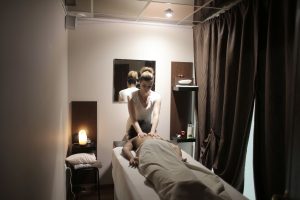 By: Zach Simpson
By: Zach Simpson
You may not be aware that the Third DCA ruled earlier this year that “Physical Therapy Modalities & Services” such as electrical muscle stimulation, ultrasound, heat, ice, and traction are not reimbursable under PIP when rendered by a massage therapist in any practice setting. Pointing in part to a law that took effect January 1, 2013 an appeals court sided with Geico General Insurance Co. in a dispute about paying for physical-therapy services provided by massage therapists to auto-accident victims.
Case Details
The Miami-Dade County case involved bills for three patients sent by Beacon Healthcare Center, Inc., under the state’s personal injury protection, or PIP, insurance system.
Physical therapy and physical therapy modalities (i.e. electrical muscle stimulation, ultrasound, heat, ice, and traction) were prescribed for auto accident patients by Beacon’s treating physician and medical director which were performed by massage therapists rather than physical therapists. Neither a licensed physician nor a physical therapist directly supervised the care performed by the massage therapists. However, when Beacon billed GEICO they noted that the supervising physician, and not the massage therapists, provided treatment. The billing statements also indicated that the massage therapists performed physical therapy modalities under the direct supervision of the medical director, whose only responsibility was to review patient files monthly. Geico General Insurance Company denied payment, which led to Beacon filing a suit in Circuit Court.
Questions of Significance for Medical Practices that the Third DCA Answered
- Can a person who is licensed as a massage therapist, but not licensed as a physical therapist, lawfully render physical therapy modalities (i.e. electrical muscle stimulation, ultrasound, heat, ice, and traction) enumerated in § 486.021(11) where such therapy is part of or incidental to the lawful practice of massage therapy?
- Can a healthcare clinic licensed under Part X Chapter 400 receive PIP reimbursements for physical therapy services enumerated in § 486.021(11) by a licensed massage therapist employed by the clinic that is not “massage” as defined by § 480.033 (3), Fla. Stat?
Third DCA Ruling
A three-judge panel for the 3rdDistrict Court of Appeals overturned an earlier ruling by the Circuit Court, citing a law that took effect Jan. 1, 2013.
The law cited by the 3rdDistrict Court of Appeals excluded massage therapists from receiving PIP reimbursements. The Court stated, “while there is some overlap between the two licensed practices, they are different practices requiring different licensures.”
The 2013 law states that medical benefits do not include massage as defined in Section. 480.033 or acupuncture as defined in section. 457.102, regardless of the person, entity, or licensee providing massage or acupuncture, and a licensed massage therapist or licensed acupuncturist may not be reimbursed for medical benefits under this section.
The appellate court ruled that while a licensed massage therapist can lawfully render physical therapy modalities pursuant to the exceptions set forth in the Physical Therapy Act, section 486.021(11), a healthcare clinic or provider licensed under Part X Chapter 400 may not receive PIP reimbursements for physical therapy services enumerated in section 486.021(11) rendered by a licensed massage therapist employed by the clinic that is not “massage” as defined by section 480.033(3), because the plain language of the PIP statute precludes those reimbursements.
The panel stated that the trial court erred “when it appeared to rely on the ‘incidental to’ language in the Physical Therapy Act, section 486.161(1), to deem the Beacon Healthcare massage therapists’ services eligible for PIP reimbursement. The services were performed in these consolidated cases by unsupervised massage therapists, regardless of the modalities used. The plain language of the PIP statute, section 627.736(1)(a)(5), precludes reimbursement to the massage therapists – or to Beacon Healthcare – as these services were erroneously billed as having been directly supervised by a licensed physical therapist or medical doctor.”
Regardless of the use of physical therapy modalities ‘incidental to the practice of massage therapy, the PIP statute precludes reimbursement for services provided by a licensed massage therapist,” said the eight-page decision, written by the appeals-court Judge Eric Hendon and joined by judges Norma Lindsey and Bronwyn Miller.
A licensed massage therapist can lawfully render physical therapy modalities (i.e. electrical muscle stimulation, ultrasound, heat, ice, and traction) enumerated in § 486.021(11) where such therapy is part of or incidental to the lawful practice of massage therapy. However, it is important for every practice setting to be aware that although a massage therapist can legally render such services, they may not be reimbursed by PIP benefits.
